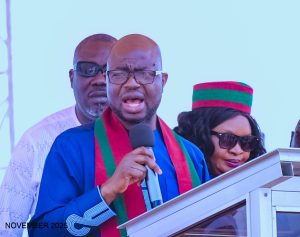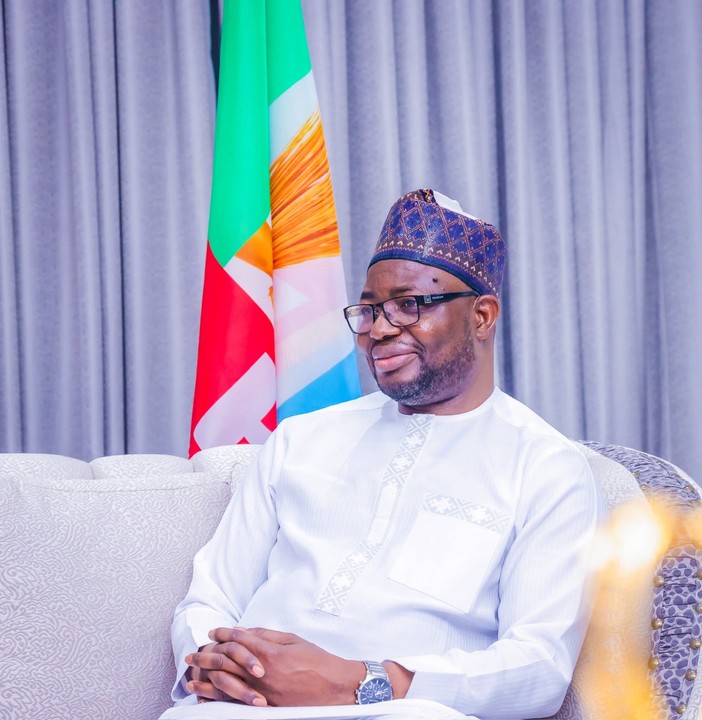Nigeria’s new Minister of Humanitarian Affairs and Poverty Reduction, Dr Bernard Mohammed Doro, has completed his first two weeks in office with a rapid series of reforms, high level meetings and field engagements, setting a fast pace for the Humanitarian Ministry.
Doro, confirmed by the Senate on October 30 and sworn in on November 6, has moved to set a clear agenda for the ministry, modernise internal systems, and build on the achievements of his predecessor, Nentawe Goshwe Yilwatda, in collaboration with international institutions. His early actions come as Nigeria continues to confront widespread poverty, displacement, and insecurity
Shortly after taking office, Doro was received at a reception in Abuja attended by his home state governor, Caleb Manasseh Mutfwang, along with representatives of international organisations, members of the APC in Plateau, APC diaspora members, supporters and family members. The event reflected the high expectations surrounding his appointment at a time when humanitarian agencies are under pressure to scale up interventions and improve support for vulnerable populations across Nigeria.

Bernard Doro Early Public Engagements
Doro’s first major public appearance came on Nov. 9 in Jos, where he addressed the Berom 2025 gathering in Plateau State. He told attendees that the ministry would carry out its mandate “clearly, independently and with impartiality,” and said programmes that reduce poverty and support vulnerable citizens would be prioritised.
A day later, on Nov. 10, he held a press conference in Jos that set out his leadership approach. He said humanitarian assistance must be treated as “a fundamental responsibility of government” rather than charity, and pledged to expand poverty reduction programmes, strengthen social protection structures and ensure that federal interventions are delivered transparently. He added that Plateau State would serve as an example of what he described as a community driven model for humanitarian coordination.
During the same visit, the minister attended the 27th Nigerian University Games Association (NUGA) tournament at the University of Jos. Speaking with students and athletes, he highlighted the role of youth empowerment in reducing poverty and described the games as an important platform for identifying and developing talent. He also acknowledged the university’s influence on his early academic and professional development.
Returning to Abuja, Doro was officially welcomed to the ministry by senior officials of the Ministry of Humanitarian Affairs and Poverty Reduction on Nov. 12. The Minister of State, Dr Yusuf Sununu, joined directors, agency heads and programme managers for a briefing session that included the presentation of handover notes.
The session focused on the need to strengthen institutional coordination and improve internal communication. Doro told staff that effective public service depends on trust and shared accountability, and said he planned to build an administrative culture centred on teamwork and transparency.
On Nov. 16, Doro joined Senate President Godswill Akpabio, who represented President Bola Ahmed Tinubu, alongside the National Chairman of the All Progressives Congress (APC), Prof. Nentawe Goshwe Yilwatda, the Governor of Nasarawa State, Abdullahi Audu Sule, and other national APC leaders to formally receive thousands of defectors from opposition parties into the ruling APC in Plateau State. Doro used the occasion to encourage the new members to support President Bola Tinubu’s administration.
“We have every reason to support our dear President. We have every reason to come out in 2027 to elect our dear President. We have every reason to come out and support everyone who will contest under the platform of the APC,” he said.
He urged the new members to amplify the party’s message and mobilise more citizens to decamp to the APC.
Read Also:
Social registry database is key to ending poverty, Doro tells World Bank team
Bernard Doro launches ECMS to drive Nigeria’s paperless civil service agenda
Doro meets UN delegation, announces new poverty reduction blueprint
On Nov. 18, the minister oversaw the launch of the Enterprise Content Management System (ECMS) in the ministry, a new digital platform designed to centralise documents, multimedia files and records. Officials said the system, now integrated into the federal government’s 1Gov platform, would streamline workflow management, ensure secure digital storage and improve access to official information.
The ministry described the platform as a major step in the federal civil service’s digital transformation. Doro said the system would support transparency and strengthen operational efficiency in the delivery of humanitarian and poverty reduction services.
Visit to Kebbi After Schoolgirl Abductions
On Nov.19, Doro travelled with Vice President Kashim Shettima to Kebbi State following the abduction of schoolgirls in Birnin Kebbi. The trip, directed by President Bola Ahmed Tinubu, aimed to reassure affected families and review federal and state response efforts.
Shettima told residents that the President “shares your anguish,” calling the attack “an assault on the collective conscience of all Nigerians.” He said the government would take all necessary measures to secure the release of the students and support families of those killed in the attack, including a vice-principal and a senior military officer.
Engagements With UN and World Bank
Later the same day, Doro held talks with a delegation from the United Nations, led by Mohammed Fall, the UN Resident and Humanitarian Coordinator. Discussions covered Nigeria’s humanitarian challenges and the need for stronger coordination between the government and international partners.
Doro said the economic reforms underway in Nigeria had created temporary hardship but argued that their long-term effects would support economic stability. He stressed the importance of strengthened collaboration with the UN to address crises driven by conflict, flooding, climate change and internal displacement.
On Nov. 21, the minister met with a World Bank delegation led by Mathew Verghis, the bank’s new Country Director for Nigeria. Talks focused on the future of Nigeria’s social protection programmes, including N-Power, the National Home Grown School Feeding Programme and the Federal Direct Cash-Transfer Scheme for vulnerable households.
Accordingly, Doro emphasised the need for a more resilient social safety net architecture that supports both short term relief and long term economic independence. He also outlined plans to incorporate the social registry database and carbon emission reduction initiatives into poverty alleviation strategies, describing them as potential sources of new livelihood opportunities.
He appealed for continued World Bank support in designing a long-term social protection framework aligned with Nigeria’s humanitarian and development priorities.
Media and Public Accountability
Minister Doro met with the North Central Media Forum, led by its president Abubakar Angara. He called for stronger media government collaboration to promote transparency and support the ministry’s public welfare objectives.
He told journalists that the ministry’s mandate remained focused on citizens at the lowest end of the economic spectrum and that improving accountability across all humanitarian programmes was a central priority.
Doro’s first two weeks have been marked by extensive domestic and international engagements, administrative restructuring and early steps toward digital transformation. Analysts say his rapid pace reflects both the urgency of Nigeria’s humanitarian needs and the pressure on the government to deliver relief and social-protection services more effectively.



